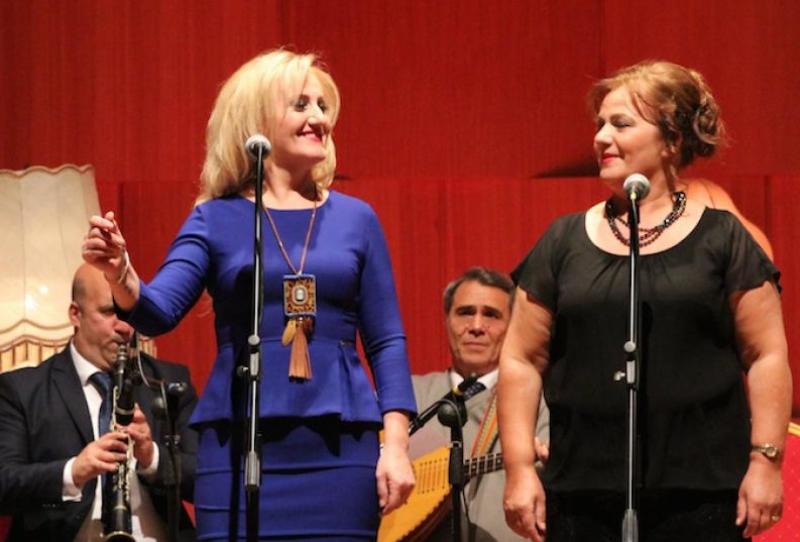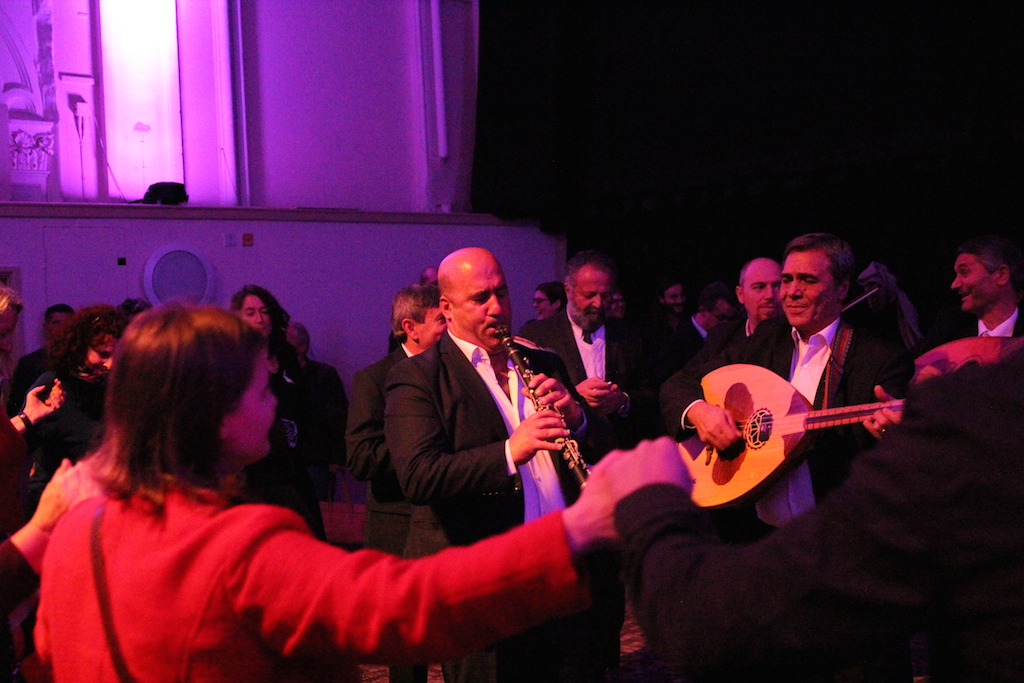Saz'iso, Colston Hall, Bristol review - bewitching music from Southern Albania | reviews, news & interviews
Saz'iso, Colston Hall, Bristol review - bewitching music from Southern Albania
Saz'iso, Colston Hall, Bristol review - bewitching music from Southern Albania
The power of saze: much joy, but never far from almost gut-wrenching sadness

A strange and wonderful moment: the standing area at the rear of The Lantern, the smaller venue at Bristol’s Colston Hall, is suddenly transformed into a corner of Southern Albania.
A band plays haunting music, rooted in the firm yet delicate beat of a frame drum, a clarinet swirling above the drone provided by violin and lutes. A stately circle moves around the musicians, with all the grace that would be displayed at a mountain wedding in Northern Epirus. There are smiles and laughter, cries of “Hopa!", and rhythmic clapping, a far cry from the grim autumn night that lies beyond the hall.
This is music way beyond the set-list, a spontaneous reaction from a band which has just delivered an immensely moving performance on stage, received with great emotion by an audience of exiles from the Balkans and Bristol world music cognoscenti. Not content to rest in their cramped dressing-room, the musicians have returned, processing through the crowd which is still hanging around, stirred to bits by the concert they’ve just heard. This is a rare bonus, as so often traditional music performed in the UK or elsewhere can suffer from being out of context.
The bewitching power of saze lies in the extraordinary vocals
The Saze Project was conceived by Andrea Goertler, Edit Pula and Joe Boyd, the legendary producer with impeccable taste and a nose for left-of-centre musical gold (The Incredible String Band, Sandy Denny, Nick Drake, Kate and Anna McGarrigle, REM, and many others). They have brought together some of the very best singers and instrumentalists from Southern Albania, who play saze, an urban music rooted in rural acapella polyphony, which is reckoned to be one of the most ancient vocal traditions in Europe. The music is indistinguishable from the polyphonic tradition of Greek Epirus, just over the wild mountain border between the two countries.
The eight musicians step on the stage with an endearing shyness – these are the first gigs they have played outside Albania, and they’re used to doing weddings after all. Their lack of stage experience is a massive plus, as they don’t feign good cheer as so many more practiced world music bands tend to do. Instead they clearly enjoy the thrill of playing together, meshing their voices as the tradition demands, in an eerie and melancholic way, trading licks in a way that maximises the power of being slightly out of sync and yet very much playing together.
The two women vocalists Donika Pecallari and Adrianna Thanou are outstanding, the latter with a deeper almost masculine voice. The sombre lower register is favoured as well by virtuoso clarinet player Telando Feto (pictured above), who sometimes provides a gentle addition to the drone of the rhythmically strummed lutes, while at other moments producing a subtle obligato to the vocals, or solos rich in decoration, reminiscent of John Coltrane’s mind-blowing "sheets of sound". Nobody here sings or plays to the gallery, except on one occasion when violonist and vocalist Aurel Qirjo can’t help himself from showing off his skills with high-pitch and harmonic-tinged fiddling, a display that elicits wild applause from the captivated audience.
Roma musicians are the stars of Balkan music, as well as being highly prized in Greece and Turkey: Pëllumb Meta, one of the three Rom members of the band, plays a variety of wind instruments with subtly controlled passion, but it’s his voice – restrained yet powerful "head-singing", in a pitch close to high tenor – that drips with unadulterated soul.
Soul might well be the best word to describe much of the show: passion restrained by a touching modesty. There is much joy here, but never far from an almost gut-wrenching sadness that comes from gently opening the heart. A constant background, as in Irish music, of melancholy tinged with joy: a feeling of the evanescence of each moment of bliss.
rating
Explore topics
Share this article
The future of Arts Journalism
You can stop theartsdesk.com closing!
We urgently need financing to survive. Our fundraising drive has thus far raised £49,000 but we need to reach £100,000 or we will be forced to close. Please contribute here: https://gofund.me/c3f6033d
And if you can forward this information to anyone who might assist, we’d be grateful.

Subscribe to theartsdesk.com
Thank you for continuing to read our work on theartsdesk.com. For unlimited access to every article in its entirety, including our archive of more than 15,000 pieces, we're asking for £5 per month or £40 per year. We feel it's a very good deal, and hope you do too.
To take a subscription now simply click here.
And if you're looking for that extra gift for a friend or family member, why not treat them to a theartsdesk.com gift subscription?
more New music
 Heartbreak and soaring beauty on Chrissie Hynde & Pals' Duets Special
The great Pretender at her most romantic and on the form of her life
Heartbreak and soaring beauty on Chrissie Hynde & Pals' Duets Special
The great Pretender at her most romantic and on the form of her life
 The Last Dinner Party's 'From the Pyre' is as enjoyable as it is over-the-top
Musically sophisticated five-piece ramp up the excesses but remain contagiously pop
The Last Dinner Party's 'From the Pyre' is as enjoyable as it is over-the-top
Musically sophisticated five-piece ramp up the excesses but remain contagiously pop
 Moroccan Gnawa comes to Manhattan with 'Saha Gnawa'
Trance and tradition meet Afrofuturism in Manhattan
Moroccan Gnawa comes to Manhattan with 'Saha Gnawa'
Trance and tradition meet Afrofuturism in Manhattan
 Soulwax’s 'All Systems Are Lying' lays down some tasty yet gritty electro-pop
Belgian dancefloor veterans return to the fray with a dark, pop-orientated sound
Soulwax’s 'All Systems Are Lying' lays down some tasty yet gritty electro-pop
Belgian dancefloor veterans return to the fray with a dark, pop-orientated sound
 Music Reissues Weekly: Marc and the Mambas - Three Black Nights Of Little Black Bites
When Marc Almond took time out from Soft Cell
Music Reissues Weekly: Marc and the Mambas - Three Black Nights Of Little Black Bites
When Marc Almond took time out from Soft Cell
 Album: Mobb Deep - Infinite
A solid tribute to a legendary history
Album: Mobb Deep - Infinite
A solid tribute to a legendary history
 Album: Boz Scaggs - Detour
Smooth and soulful standards from an old pro
Album: Boz Scaggs - Detour
Smooth and soulful standards from an old pro
 Emily A. Sprague realises a Japanese dream on 'Cloud Time'
A set of live improvisations that drift in and out of real beauty
Emily A. Sprague realises a Japanese dream on 'Cloud Time'
A set of live improvisations that drift in and out of real beauty
 Trio Da Kali, Milton Court review - Mali masters make the ancient new
Three supreme musicians from Bamako in transcendent mood
Trio Da Kali, Milton Court review - Mali masters make the ancient new
Three supreme musicians from Bamako in transcendent mood
 Hollie Cook's 'Shy Girl' isn't heavyweight but has a summery reggae lilt
Tropical-tinted downtempo pop that's likeable if uneventful
Hollie Cook's 'Shy Girl' isn't heavyweight but has a summery reggae lilt
Tropical-tinted downtempo pop that's likeable if uneventful
 Pop Will Eat Itself's 'Delete Everything' is noisy but patchy
Despite unlovely production, the Eighties/Nineties unit retain rowdy ebullience
Pop Will Eat Itself's 'Delete Everything' is noisy but patchy
Despite unlovely production, the Eighties/Nineties unit retain rowdy ebullience

Add comment